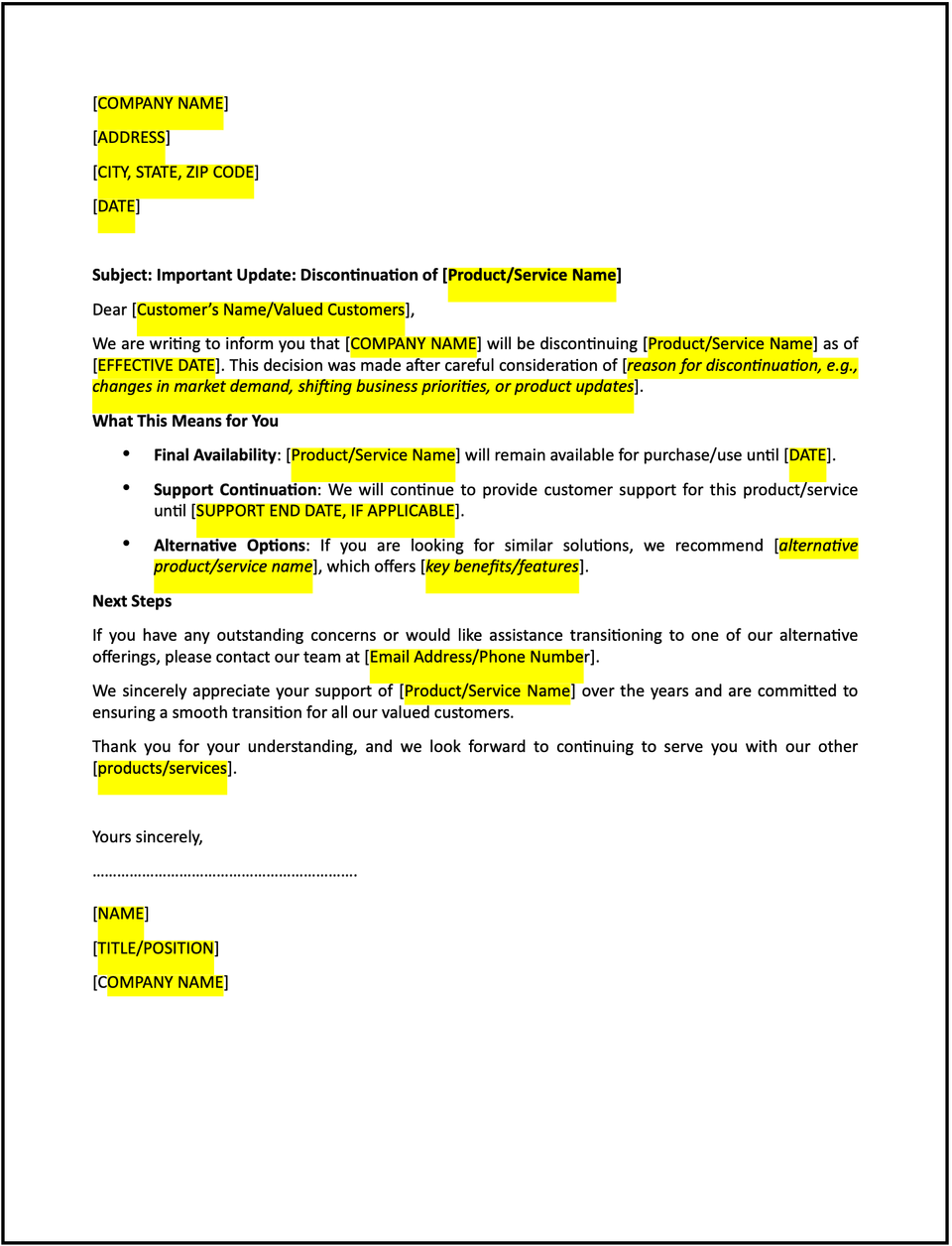Notification letter of the discontinuation of a product or service: Free template

Letter of the discontinuation of a product or service
A notification letter of the discontinuation of a product or service is a formal way to inform customers, stakeholders, or partners about the decision to end the availability of a specific offering. This letter explains the reasons for the discontinuation, provides next steps, and offers alternatives or support, fostering transparency and goodwill.
How to use this letter of the discontinuation of a product or service
- Open with the announcement: Begin by clearly stating that the product or service will be discontinued.
- Specify the details: Include the name of the product or service, the discontinuation date, and any key information about its availability until then.
- Explain the reason: Briefly outline the rationale for the decision, such as evolving market needs, strategic realignment, or product performance.
- Highlight the impact: Describe how the discontinuation may affect customers or stakeholders and the steps being taken to minimize inconvenience.
- Offer alternatives: Recommend replacement products, services, or solutions if applicable, to address customer needs.
- Provide next steps: Share instructions for actions customers may need to take, such as transitioning to a new product or contacting support for assistance.
- Maintain a professional and empathetic tone: Ensure the letter reflects accountability, understanding, and support.
- Provide contact information: Include details for recipients to reach out with questions, concerns, or further assistance.
Benefits of using a letter of the discontinuation of a product or service
This letter template ensures a structured and professional way to communicate discontinuations while fostering transparency and trust. Here’s how it helps:
- Promotes transparency: Clearly outlining the decision builds trust and minimizes confusion.
- Encourages goodwill: Offering alternatives or solutions demonstrates care for customer needs.
- Reflects professionalism: A well-crafted letter reassures recipients of the organization’s competence and respect for stakeholders.
- Reduces dissatisfaction: Providing clear reasons and support mitigates potential frustration.
- Provides documentation: A formal record of the notification supports compliance and customer relations.
Tips for writing an effective letter of the discontinuation of a product or service
- Be specific: Clearly describe the product or service, the discontinuation date, and any associated details.
- Use professional language: Maintain a respectful and empathetic tone to reassure recipients.
- Highlight reasoning: Briefly explain the rationale for the discontinuation to build trust.
- Include actionable advice: Provide instructions for transitioning to alternatives or seeking support.
- Keep it concise: Focus on the key points while ensuring the tone is professional and understanding.
Frequently asked questions (FAQs)
Q: What details should I include in this letter?
A: Include the product or service name, discontinuation date, reason for the decision, and suggested alternatives or next steps.
Q: Should I personalize the letter?
A: While a general letter works for broad audiences, personalizing for key stakeholders can add a thoughtful touch.
Q: Who typically sends this letter?
A: The product, customer relations, or communications team usually sends this letter.
Q: How formal should this letter be?
A: The tone should be professional yet empathetic, focusing on transparency and support.
Q: When should this letter be sent?
A: Send the letter well in advance of the discontinuation date to provide recipients ample time to adjust.
Q: Can this letter include compensation details?
A: Yes, mentioning discounts, credits, or transition incentives can help maintain goodwill.
Q: Is acknowledgment from the recipient required?
A: While not mandatory, encouraging acknowledgment ensures recipients are aware of the discontinuation and prepared for its impact.
This article contains general legal information and does not contain legal advice. Cobrief is not a law firm or a substitute for an attorney or law firm. The law is complex and changes often. For legal advice, please ask a lawyer.


